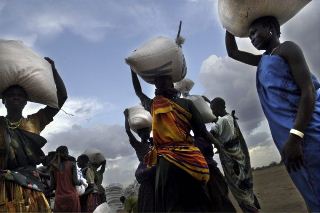28,000 people facing starvation in South Sudan: minister
August 6, 2019 (AWEIL) – An estimated 28,000 people are facing serious starvation in South Sudan’s Aweil State, a minister said Monday.

Akook, Juba Monitor reported, said the food gap has contributed to looming poverty and hunger in rural areas after seasonal rains caused flooding, adding that people living in lowlands are most affected and unable to cultivate their farms due to floods.
Some 275,000, a recent Integrated Food Security Phase Classification assessment report indicated, have been facing food crisis between May and July in the same area.
Severe drought and ongoing violence in East Africa has put 8.7 million people in Somalia and South Sudan at risk of severe food insecurity, an aid agency said last week.
The International Rescue Committee (IRC) called for early action and increased support to avert famine in South Sudan and Somalia.
The aid agency, in a release, said failure of the long rains in Somalia and impact of the war in South Sudan have led to massive displacement, limited agriculture, increased food prices and inflation.
After more than five years of conflict, South Sudan remains one of the most food-insecure countries in the world with almost 7 million people reportedly severely food insecure. It is estimated that at least 21,000 people in South Sudan are living in famine conditions.
“Multiple countries in East Africa where the IRC works, especially Somalia and South Sudan, are facing extremely high levels of hunger. The IRC calls for early action and increased humanitarian support to these countries now in order to avert famine and save lives,” said Dr. Mesfin Teklu Tessema, senior director of health at IRC.
According to the aid agency, 860,000 children in South Sudan and nearly 1 million in Somalia are expected to suffer from acute malnutrition this year as access to treatment is seldom guaranteed.
IRC said it has over 400 staff in South Sudan responding to the increasingly dire food insecurity crisis through its support for health, nutrition, reproduction health and women’s protection and empowerment, child protection and livelihoods.
South Sudan plunged into civil war in mid-December 2013 when President Salva Kiir accused his ex-deputy, Riek Machar, of plotting a coup.
In September 2018, the country’s arch-rivals signed a peace deal to end the civil war that killed tens of thousands of people and displaced millions.
(ST)
